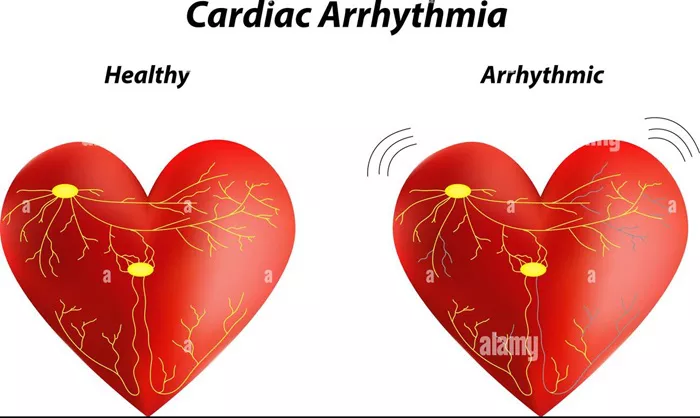Heart arrhythmia, a condition characterized by an irregular heartbeat, can range from harmless to life-threatening. Proper treatment and management are crucial to maintain heart health and prevent complications. This article explores various strategies to treat and manage heart arrhythmia, focusing on lifestyle changes, medications, medical procedures, and alternative therapies.
What Can You Do for Heart Arrhythmia
Lifestyle Changes to Manage Arrhythmia
1. Adopt a Heart-Healthy Diet
A diet rich in fruits, vegetables, whole grains, and lean proteins can help manage arrhythmia by improving overall heart health. Key dietary components include:
Omega-3 Fatty Acids: Found in fish like salmon and mackerel, these can reduce the risk of arrhythmias.
Potassium: Essential for maintaining normal heart rhythm, found in bananas, oranges, and leafy greens.
Magnesium: Helps regulate heart rhythm, available in nuts, seeds, and whole grains.
See Also: What Are The Five Lethal Arrhythmias
2. Maintain a Healthy Weight
Being overweight or obese increases the risk of heart disease and arrhythmia. Regular exercise and a balanced diet can help achieve and maintain a healthy weight, reducing strain on the heart.
3. Avoid Stimulants
Substances like caffeine, nicotine, and certain medications can trigger arrhythmias. Limiting or avoiding these stimulants can help reduce the frequency and severity of arrhythmia episodes.
4. Manage Stress
Chronic stress and anxiety can contribute to arrhythmia. Techniques such as yoga, meditation, deep breathing exercises, and counseling can help manage stress levels effectively.
Medications for Arrhythmia
1. Antiarrhythmic Drugs
These medications help control heart rhythm by normalizing the electrical impulses in the heart. Common antiarrhythmic drugs include:
- Amiodarone
- Flecainide
- Sotalol
2. Beta-Blockers
Beta-blockers reduce the heart rate and lower blood pressure, making them useful in managing arrhythmias. Common beta-blockers include:
- Atenolol
- Metoprolol
- Propranolol
3. Calcium Channel Blockers
These medications help slow the heart rate and are particularly effective in treating atrial fibrillation. Examples include:
- Diltiazem
- Verapamil
4. Anticoagulants
For patients with atrial fibrillation, anticoagulants or blood thinners are prescribed to prevent blood clots and reduce the risk of stroke. Common anticoagulants include:
- Warfarin
- Dabigatran
- Rivaroxaban
see also: Does Smoking Cause Arrhythmia
Medical Procedures for Arrhythmia
1. Electrical Cardioversion
This procedure uses a controlled electric shock to restore normal heart rhythm. It is often used for atrial fibrillation or atrial flutter that doesn’t respond to medications.
2. Catheter Ablation
Catheter ablation involves inserting thin, flexible tubes (catheters) into the heart through blood vessels. Radiofrequency energy or cryotherapy is then used to destroy small areas of heart tissue causing the arrhythmia.
3. Pacemaker Implantation
A pacemaker is a small device implanted under the skin that helps regulate slow heartbeats. It sends electrical impulses to prompt the heart to beat at a normal rate.
4. Implantable Cardioverter-Defibrillator (ICD)
An ICD is a device implanted in the chest that monitors heart rhythms and delivers electric shocks when necessary to control life-threatening arrhythmias like ventricular tachycardia or ventricular fibrillation.
5. Maze Procedure
The maze procedure is a surgical technique used to treat atrial fibrillation. Small incisions are made in the atria to create a “maze” of scar tissue that disrupts abnormal electrical signals.
Alternative Therapies for Arrhythmia
1. Acupuncture
Some studies suggest that acupuncture may help reduce the frequency of arrhythmia episodes and improve overall heart health by promoting relaxation and reducing stress.
2. Herbal Supplements
Certain herbal supplements, such as hawthorn and valerian, are believed to support heart health and may help manage arrhythmia symptoms. However, it is essential to consult a healthcare provider before using any supplements.
3. Biofeedback
Biofeedback is a technique that helps individuals gain control over involuntary physiological processes. It can be used to manage stress and anxiety, potentially reducing arrhythmia episodes.
4. Yoga and Meditation
Regular practice of yoga and meditation can enhance relaxation, reduce stress, and improve overall cardiovascular health, which may help manage arrhythmia.
Preventive Measures
1. Control Blood Pressure and Cholesterol
High blood pressure and cholesterol levels increase the risk of heart disease and arrhythmias. Regular monitoring and management through diet, exercise, and medication can help keep these levels in check.
2. Manage Diabetes
Diabetes increases the risk of heart disease and arrhythmias. Proper management of blood sugar levels through diet, exercise, and medication is essential.
3. Avoid Alcohol and Drugs
Excessive alcohol and recreational drug use can trigger arrhythmias. Limiting alcohol intake and avoiding drugs can significantly reduce the risk.
4. Stay Active
Regular physical activity strengthens the heart and improves cardiovascular health, reducing the risk of arrhythmias.
Conclusion
Heart arrhythmia can be a manageable condition with the right combination of lifestyle changes, medications, medical procedures, and alternative therapies. Regular monitoring and follow-up care are crucial to ensure effective management and prevent complications. By adopting a heart-healthy lifestyle, avoiding triggers, and adhering to prescribed treatments, individuals with arrhythmia can lead healthy, active lives. Always consult a healthcare professional before making any significant changes to your health regimen to ensure safety and efficacy.

